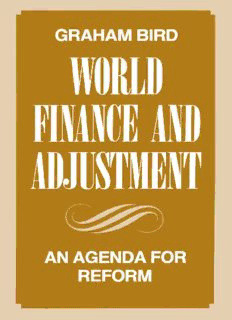
World Finance and Adjustment: An Agenda for Reform PDF
Preview World Finance and Adjustment: An Agenda for Reform
WORLD FINANCE AND ADJUSTMENT By the same author THE INTERNATIONAL MONETARY SYSTEM AND THE LESS DEVELOPED COUNTRIES THE QUEST FOR ECONOMIC STABILIZATION: The IMF and the Third World (with Tony Killick, Jennifer Sharpley and Mary Sutton) WORLD FINANCE AND ADJUSTMENT An Agenda for Reform Graham Bird Palgrave Macmillan ISBN 978-0-333-38877-8 ISBN 978-1-349-17938-1 (eBook) DOI 10.1007/978-1-349-17938-1 © Graham Bird 1985 Softcover reprint of the hardcover 1st edition 1985 All rights reserved. For information, write: St. Martin's Press, Inc., 175 Fifth Avenue, New York, NY 10010 Published in the United Kingdom by The Macmillan Press Ltd. First published in the United States of America in 1985 ISBN 978-0-312-89125-1 Library of Congress Cataloging in Publication Data Bird, Graham R. World finance and adjustment. Bibliography: p. Includes index. 1. International finance. 2. Monetary policy. 3. Balance of payments. I. Title. HG388l.B538 1985 332'.042 85-2157 ISBN 978-0-312-89125-1 To my family Contents List of Tables xi Preface and Acknowledgements xiii I Introduction 1 PART I THE BACKGROUND TO REFORM 5 2 World Economic Performance: Facts, Theories and Controversies 7 1 Introduction 7 2 Indicators for Assessing Economic Performance 8 3 Applying the Indicators: Judging World Economic Performance 13 4 Explaining World Economic Performance: Contending Theories 30 5 General Policy Options and the Framework for Policy Implementation 42 3 The World's Financial System in Perspective 45 1 Key Features of World Monetary Systems 46 2 The Evolution of the World Monetary System 46 4 An Agenda for International Financial Reform 63 1 Agenda Items 63 2 The Mechanics of Reform: Grand Design or Piecemeal? 68 PART II INTERNATIONAL FINANCING 71 5 International Reserves: Supply, Demand and Adequacy 73 1 Introduction 73 2 International Reserve Assets 74 3 The Numeraire Debate: Gold versus Foreign Exchange w~~sD~ ~ 4 The Adequacy of International Reserves 89 5 Policy Issues 101 Appendix: SDR Valuation 111 VII Vlll Contents 6 Short-term Capital Markets, the Private Banks, and the IMF 114 1 Introduction 114 2 The Euro-currency Market 115 3 The Private International Banks 123 4 The International Monetary Fund 135 5 Remaining Issues 142 7 Foreign Aid and the Private Bond Market 144 1 The Bond Market 144 2 Foreign Aid 145 8 Debt 175 1 Introduction 175 2 The Economics of Debt 175 3 The Size of the Debt Problem: Some Facts and Figures 183 4 Short-term Policy: Rescheduling 190 5 Solutions to the Debt Problem 195 6 Criticisms of Proposed Solutions 200 7 Concluding Remarks 201 PART III BALANCE OF PAYMENTS ADJUSTMENT 203 9 The Need for and Means of Balance of Payments Adjustment 205 1 Introduction 205 2 What is the Balance of Payments? 205 3 The Causes of Balance of Payments Disequilibria 208 4 The Choice between Financing and Adjustment 217 5 What Adjustment has to Achieve: Expenditure Reducing and Switching Effects 219 6 The Specifics of Policy 221 7 The Choice of Adjustment Policy 232 8 Judging the Success of a Balance of Payments Policy 236 9 The Role of the IMF as an Adjustment Institution 238 10 Global Aspects of Adjustment 239 10 Exchange Rates: Systems and Policies 241 1 Definitions 242 2 Fixed Exchange Rate Systems 245 3 Flexible Exchange Rate Systems: the Arguments For and Against 249 4 Evaluating the Experience with Flexible Exchange Rates 253 5 The Future Exchange Rate System: the Policy Options 258 6 Exchange Rate Determination: a Postscript 267 Contents ix PART IV THE POLITICAL ECONOMY OF WORLD FINANCIAL REFORM 279 11 The Interests of Developing Countries in World Financial Reform 281 1 Introduction 281 2 Developing Countries as a Special Case in International Financial Reform 282 3 Mechanisms for Assisting Developing Countries 284 4 Some Concluding Remarks 305 12 International Financial Institutions: the Role of the IMF 307 1 Introduction 307 2 Background: the Changing Position of the Fund 307 3 Principal Elements of an International Financial System and the Scope for the Fund 309 4 A Role for the Fund 317 5 A Programme for Reform 318 6 The Implications of Reform 322 7 The Political Economy of Reform 324 Notes and References 326 Further Reading 332 Author Index 341 Subject Index 343 List of Tables 2.1 Unemployment in major industrial countries, 1963-83 15 2.2 Inflation in industrial and developing countries, 1963-83 16 2.3 World prices of manufactures and primary commodities in US $, 1963-83 19 2.4 Economic growth: changes in output in industrial and developing countries, 1963-83 20 2.5 Summary of payments balances on current account, 1973-83 24 2.6 Long-term and short-term external debt of non-oil developing countries relative to exports and to GOP, 1973-83 26 2. 7 Short-term real interest rates in major industrial countries 29 2.8 Central government fiscal balances and impulses in major industrial countries, 1978--83 39 3.1 Financial facilities of the Fund, their conditionality and possible cumulative purchases 52 5.1 Official holdings of reserve assets, end of selected years 1973-82 and end of March 1983 76 6.1 Euro-currency market size 118 6.2 US balance of payments and the growth of the Euromarket 120 6.3 External lending and deposit-taking of banks in the BIS reporting area, 1978--82 124 6.4 Euro-currency bank credits - by country of borrower 132 6.5 Selected IMF financial activities by type and country, 1976-83 136 6.6 Low-conditionality and high-conditionality purchases, 1976-83 139 7.1 The international bond market 146 7.2 Principal borrowers in the international bond market 148 7.3 Total net resource receipts of developing countries from all sources, 1970-82 - constant prices 156 7.4 ODA as a percentage of GNP, 1970-82 158 xi
